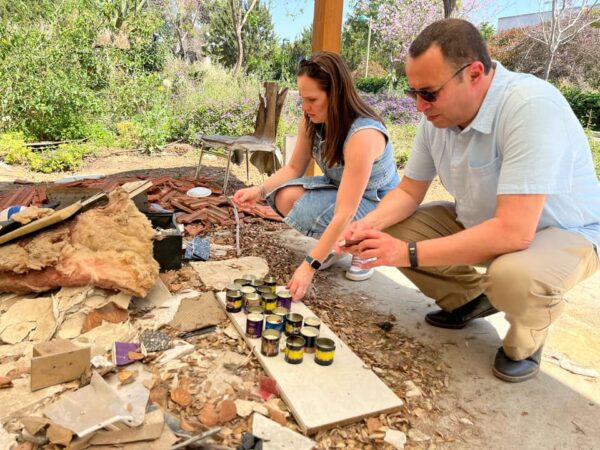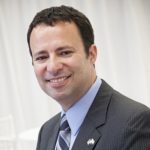
Tuesday I was in our partner community of Arad for meetings and coffee with Yair Maayan, the newly elected mayor, after a day of site visits in Ofakim. You can watch a short video that I sent from the hardest-hit neighborhood of Ofakim.
Before that my colleagues Michal Werner, Michal Zur, and I went to Beeri, Nova, and Kibbutz Erez, and we visited the Erez evacuees in Kiryat Gat in their temporary building. I don’t want to go too deep into the Beeri and Nova massacre site visits. I did post a long social media report with photos and video, and you can see that here, as well as a visit to the Hostages Square and what that felt like.
I’ve also met with partners in Rishon LeZion, including the wonderful Feinberg Center and the matnas (community center) in Ramat Eliyahu. Along with the inspiring leadership of the Feinberg family, we’ve been supporting a project to bring in a large bomb shelter and protective space there, designated for their population of children with autism and special needs, which should be arriving in two weeks. All of which got me thinking about how we as a Jewish community have built our response to the evils we’ve seen on October 7 and this last Saturday night. Sitting with a psychologist friend for lunch today, who was telling me about his patients who had been through the battles that day, it was very obvious that so many Israelis – if not most – are still living through the horrors and pain of that terror attack. People still can’t ‘move on,’ nor should we expect them to.
Meanwhile, there’s vigorous debate here on how to respond to the Iranian attack. While there are different approaches, just about everyone I’m talking with seems to agree on two things: that a reaction of some sort is needed, but also that it should be done in coordination with the United States. There’s less agreement on the ‘how’ and the ‘when.’ Opinions differ: some believe hitting back in the next few days is important to make consequences clear; others want to take their time and make the Iranians nervous while coordinating better with Israel’s allies. I had dinner with a government minister the other evening, who framed it well: we need to respond, he said. But we don’t need to respond in the way that everyone expects us to.
Then, there’s the question of whether to attack openly or maintain plausible deniability. An open attack may involve the IDF bombing Iran or shooting missiles at the country; a semi-clandestine approach would involve targeted assassinations, physical sabotage efforts, or cyber-attacks. Options that seem to have been written about a lot are operations to take out the power grid in Iran using various indirect methods, and some kind of extreme cyber attack, especially in coordination the US. That would allow Israel to maintain deterrence without forcing Iran to respond. Part of the debate is complicated by the fact that PM Netanyahu hasn’t spoken to the Israeli public since the attack on Saturday night. On Israeli television, one commentator angrily pointed out that after 30 years of saying that he was the only one who could prevent an attack on Iran, Israel was “in fact” saved by the ‘traitorous’ Air Force, the Arrow system developed by PM Rabin, and the Iron Dome developed by PM Olmert, and funded by President Obama. I think it’s a lot more nuanced and complicated than that, but it won’t surprise you to learn that the political debate continues.
We are not part of that debate. We support Israel, its elected government, and its people. We stand with Israel at its time of need, just like we stand with Israel in more peaceful times.
One more thing. In Arad, I had dinner with members of the peoplehood and steering committee groups. And we talked about Israel-Diaspora relations, how we’re feeling, and what makes us optimistic in these troubled times. Looking around, I felt that these dialogues, these encounters, were what really gives me hope. Greater MetroWest is in Arad, not just as a funder or partner, but as a real participant and with real people who share our path.
Long may we enjoy this.

